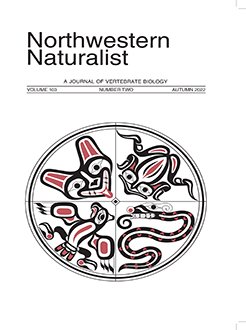The Northwestern Pond Turtle (Actinemys marmorata) ranges from Washington to the southern end of the Central Valley of California. Because of the extensive latitudinal range of the species, it is expected that several life-history traits will vary across the range. Most data on population structure and growth of A. marmorata have been gathered from southern Oregon and California, and reproductive data are sparse north of the southern end of the range. These data are important to a critical understanding of the species' biology and especially for making conservation judgments for a species some consider in need of protection. Thus, we collected key life-history information at the Luckiamute State Natural Area in the mid-Willamette Valley, Oregon. We found that the population structure, adult size, and growth were similar to southern Oregon sites. Clutch size from radiographs was 6.0 ± 1.18 SE (range = 5–8), smaller than sites at the southern end of the range. The slow growth rate of Luckiamute turtles may be explained by cooler temperature in the Willamette Valley compared to more southerly sites. Still, Luckiamute adults reach a slightly larger size than most turtles in more southerly sites. It just requires many more years to reach sexual maturity and achieve larger sizes in northern areas.
How to translate text using browser tools
1 August 2022
GROWTH AND REPRODUCTION OF NORTHWESTERN POND TURTLES IN THE MID-WILLAMETTE VALLEY, OREGON
David J Germano,
R Bruce Bury,
Gwendolynn W Bury
ACCESS THE FULL ARTICLE

Northwestern Naturalist
Vol. 103 • No. 2
Autumn 2022
Vol. 103 • No. 2
Autumn 2022
Actinemys marmorata
carapace lengths
clutch size
growth rates
Luckiamute State Natural Area
Northwestern Pond Turtles
Oregon




